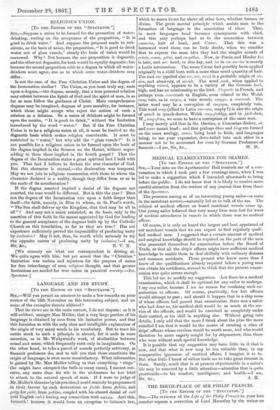RELIGIOUS UNION.
[To TILE EDITOR OF THE "SPECTATOR."]
Sin,—Suppose a union to be formed for the promotion of water- drinking, resting on the acceptance of the proposition, "It is good to drink water." And suppose the proposal made to sub- stitute, as the basis of union, the proposition, "It is good to drink water out of glass vessels," clearly the basis of union would be narrowed. Why ? Not because the one proposition is dogmatic, and the other not dogmatic, for both would be equally dogmatic; but because the second proposition adds to a dogma in which all water- drinkers must agree, one as to which some water-drinkers may differ.
Is not the case of the Free Christian Union and the dogma of the Incarnation similar? The Union, as you most truly say, rests upon a dogma,—the dogma, namely, that a true personal relation may subsist between the Spirit of God and the spirit of man, in so far as men follow the guidance of Christ. More comprehensive dogmas may be imagined, dogmas of pure morality, for instance, which those might accept who reject the notion of such a relation as a delusion. So a union of drinkers might be formed upon the maxim, "It is good to drink," without the limitation introduced by the word "water." But if the Free Christian Union is to be a religious union at all, it must be limited to the dogmatic basis which makes religion conceivable. It must be restricted to "water," but why add the "glass vessels?" Is it not possible for a religious union to be formed upon the basis of the dogma implied in the Sermon on the Mount, without super. adding to them those implied in the fourth gospel ? That the dogma of the Incarnation states a great spiritual fact I hold with you. That fact I believe to declare the true character of God. But this character is eternal,—the declaration was temporal. May we not join in religious communion with those to whom the character declared is a reality, though they differ from us as to the mode of its manifestation ?
If the dogma asserted implied a denial of the dogmas not asserted, the case would be different. But is this the case ? Does not the dogma of the Incarnation rest upon a faith deeper than itself—the faith, namely, in Him to whom, in St. Paul's words, "The Son shall deliver up the Kingdom, that God may be all in all " ? And may not a union restricted, as its basis, only to the assertion of this faith be the means appointed by God for leading to the general acceptance of the dogmas built up by the Catholic Church on this foundation, so far as they are true ? Has not experience sufficiently proved the impossibility of producing unity by exclusion? May it not, then, be worth while seriously to try the opposite course of producing unity by inclusion ?—I am,
[We scarcely see what our correspondent is driving at. We quite agree with him, but yet assert that the "Christian" limitation was useless and injurious for the purpose of union for free interchange of even religious thought, and that greater limitations are needed for true union in practical worship.—ED. Spectator.]






























 Previous page
Previous page